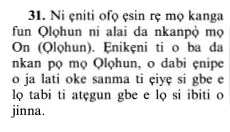22vs31
Select any filter and click on Go! to see results
حُنَفَاء لِلَّهِ غَيْرَ مُشْرِكِينَ بِهِ وَمَن يُشْرِكْ بِاللَّهِ فَكَأَنَّمَا خَرَّ مِنَ السَّمَاء فَتَخْطَفُهُ الطَّيْرُ أَوْ تَهْوِي بِهِ الرِّيحُ فِي مَكَانٍ سَحِيقٍ
Hunafaa lillahi ghayra mushrikeena bihi waman yushrik biAllahi fakaannama kharra mina alssamai fatakhtafuhu alttayru aw tahwee bihi alrreehu fee makanin saheeqin
Index Terms
Click to play
Yoruba Translation

Hausa Translation
Kuna mãsu tsayuwa ga gaskiya dõmin Allah, ba masu yin shirka da Shi ba. Kuma wanda ya yi shirka da Allah, to, yanã kamar abin da ya fãɗo daga sama, sa´an nan tsuntsãye su cafe shi, ko iska ta fãɗa da shi a cikin wani wuri mai nisa.
Asbabu n-Nuzuul (Occasions of Revelation)
حُنَفَاء لِلَّهِ غَيْرَ مُشْرِكِينَ بِهِ ...
So shun the Rijs of the idols, and shun lying speech. Hunafa' Lillah, not associating partners unto Him;
Allah says:
حُنَفَاء لِلَّهِ ...
Hunafa' Lillah,
means, sincerely submitting to Him Alone, shunning falsehood and seeking the truth.
Allah says:
... غَيْرَ مُشْرِكِينَ بِهِ ...
not associating partners unto Him;
Then Allah gives a likeness of the idolator in his misguidance and being doomed and being far away from true guidance, and says:
... وَمَن يُشْرِكْ بِاللَّهِ فَكَأَنَّمَا خَرَّ مِنَ السَّمَاء ...
and whoever assigns partners to Allah, it is as if he had fallen from the sky,
meaning,
... فَتَخْطَفُهُ الطَّيْرُ ...
the birds caught him in midair,
... أَوْ تَهْوِي بِهِ الرِّيحُ فِي مَكَانٍ سَحِيقٍ ﴿٣١﴾
or the wind had thrown him to a far off place.
means, remote and desolate, dangerous for anyone who lands there.
Hence it says in the Hadith of Al-Bara':
إِنَّ الْكَافِرَ إِذَا تَوَفَّتْهُ مَلَائِكَةُ الْمَوْتِ وَصَعِدُوا بِرُوحِهِ إِلَى السَّمَاءِ، فَلَا تُفْتَحُ لَهُ أَبْوَابُ السَّمَاءِ بَلْ تُطْرَحُ رُوحُهُ طَرْحًا مِنْ هُنَاك
When the angels of death take the soul of the disbeliever in death, they take his soul up to the heaven, but the gates of heaven are not opened for him; on the contrary, his soul is thrown down from there.
Then he recited this Ayah.
The Hadith has already been quoted in our explanation of Surah Ibrahim.
Allah gives another parable of the idolators in Surah Al-An`am, where He says:
قُلْ أَنَدْعُواْ مِن دُونِ اللَّهِ مَا لاَ يَنفَعُنَا وَلاَ يَضُرُّنَا وَنُرَدُّ عَلَى أَعْقَـبِنَا بَعْدَ إِذْ هَدَانَا اللَّهُ كَالَّذِى اسْتَهْوَتْهُ الشَّيَـطِينُ فِى الاٌّرْضِ حَيْرَانَ لَهُ أَصْحَـبٌ يَدْعُونَهُ إِلَى الْهُدَى ائْتِنَا قُلْ إِنَّ هُدَى اللَّهِ هُوَ الْهُدَى
Say:
"Shall we invoke others besides Allah, that can do us neither good nor can harm us, and shall we turn back on our heels after Allah has guided us -- like one whom the Shayatin have made to go astray in the land in confusion, his companions calling him to guidance (saying): `Come to us.'''
Say: "Verily, Allah's guidance is the only guidance.'' (6:71)
" حنفاء لله غير مشركين به " وقال سفيان الثوري عن عاصم بن أبي النجود عن وائل بن ربيعة عن ابن مسعود أنه قال : تعدل شهادة الزور الإشراك بالله ثم قرأ هذه الآية وقوله " حنفاء لله " أي مخلصين له الدين منحرفين عن الباطل قصدا إلى الحق ولهذا قال " غير مشركين به " ثم ضرب للمشرك مثلا في ضلاله وهلاكه وبعده عن الهدى فقال " ومن يشرك بالله فكأنما خر من السماء " أي سقط منها " فتخطفه الطير " أي تقطعه الطيور في الهواء " أو تهوي به الريح في مكان سحيق " أي بعيد مهلك لمن هوى فيه ولهذا جاء في حديث البراء أن الكافر إذا توفته ملائكة الموت وصعدوا بروحه إلى السماء فلا تفتح له أبواب السماء بل تطرح روحه طرحا من هناك ثم قرأ هذه الآية وقد تقدم الحديث في سورة إبراهيم بحروفه وألفاظه وطرقه وقد ضرب تعالى للمشركين مثلا آخر في سورة الأنعام وهو قوله " قل أندعو من دون الله ما لا ينفعنا ولا يضرنا ونرد على أعقابنا بعد إذ هدانا الله كالذي استهوته الشياطين في الأرض حيران له أصحاب يدعونه إلى الهدى ائتنا قل إن هدى الله هو الهدى " الآية .
"حنفاء لله" مسلمين عادلين عن كل دين سوى دينه "غير مشركين به" تأكيد لما قبله وهما حالان من الواو "ومن يشرك بالله فكأنما خر" سقط "من السماء فتخطفه الطير" أي تأخذه بسرعة "أو تهوي به الريح" أي تسقطه "في مكان سحيق" بعيد فهو لا يرجى خلاصه
معناه مستقيمين أو مسلمين مائلين إلى الحق . ولفظة " حنفاء " من الأضداد تقع على الاستقامة وتقع على الميل . و " حنفاء " نصب على الحال . وقيل : " حنفاء " حجاجا ; وهذا تخصيص لا حجة معه .
I'raab - grammatical analysis of the Qur'an
«حُنَفاءَ» حال منصوبة «لِلَّهِ» لفظ الجلالة مجرور باللام متعلقان بحنفاء «غَيْرَ» حال منصوبة «مُشْرِكِينَ» مضاف إليه مجرور بالياء لأنه جمع مذكر سالم «بِهِ» متعلقان بمشركين «وَمَنْ» الواو عاطفة ومن شرطية مبتدأ «يُشْرِكْ» مضارع مجزوم فعل الشرط والفاعل هو «بِاللَّهِ» لفظ الجلالة مجرور بالباء متعلقان بيشرك «فَكَأَنَّما» الفاء رابطة للجواب وكأنما كافة ومكفوفة «خَرَّ» ماض فاعله مستتر والجملة جواب الشرط وجملتا الشرط والجواب خبر من «مِنَ السَّماءِ» متعلقان بخر «فَتَخْطَفُهُ» الفاء عاطفة ومضارع ومفعوله «الطَّيْرُ» فاعل مؤخر والجملة معطوفة «أَوْ» حرف عطف «تَهْوِي» مضارع مرفوع بالضمة المقدرة على الياء للثقل «بِهِ» متعلقان بتهوي «الرِّيحُ» فاعل والجملة معطوفة «فِي مَكانٍ» متعلقان بتهوي «سَحِيقٍ» صفة
